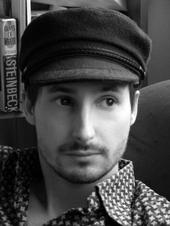Born and raised in Wandsworth , south London , Chris Campion began playing guitar at the age of ten. Rather than learning other peoples songs he immediately began writing his own, using his fathers old, half broken acoustic. Six months later he handed his first set of demo tapes to his older brother, who told him to keep going, he wasn’t there yet.
He formed his first band at the age of fourteen, playing Led Zeppelin and Jimi Hendrix songs as well as his own. They played for about a year before the band members went their separate ways. At 17 he attended Kingston College where he formed the band “Sylvia Vaneâ€, heavily influenced by Nirvana, Suede and The Smiths, this was his first serious band and they began in earnest to create something new. It was also at Kingston that he ran into his old school mate Dan Lucas and the two of them began writing anti-folk songs which later formed the basis for the band “ Horsenation .â€
After Kingston , Sylvia Vane moved into a house in Bristol where they intended to mature as a band and start to gig. But after six months of apathy, depression and teenage rage, Chris moved back to London and started to gig on his own under the name “Lucien Sable.†This is when his songwriting really began to mature, playing gigs around north London , sometimes alone, sometimes with other singer-songwriter friends. After a spell of living in a council flat in Clapham , Chris stopped gigging under the name Lucien Sable and began “Zero Point†having felt that this name summed up the dualism in his own work.
Chris now lives and gigs out of North London where he is an accomplished session player, creates soundtracks for short films and works with many bands as both a singer and guitarist. Outside of music Chris writes short stories, makes photographic art and has made or been a part of ten short films, as an actor, writer and producer and continues to collaborate with ex-Sylvia Vane member Peter Thomas on new films with ever widening scope and technical accomplishment.
"As seen from a taxi window, sitting on church steps, a bow tie like a propeller, playing songs that he was to sing at a wedding (as the father of the bride would later comment, “war chants for the Englishâ€), he looks almost as if he were about to be blown away. When you hold hands with him – if you are ever to hold hands with him, (perhaps helping him into the darker churches trying to make textual sense of the beauty), it’s a surprise they’re as hard as they are, too many knuckles through plaster walls, too many fingers on strings – calluses not sores. We’ve played a little at being Eton interns though we lacked the money or education and a little at being rock stars though we lacked the money or self-confidence. If I never see him again, it’ll be asleep against his will, eyes closed (deliberately) to the ugly things that others and I might do, and my mother scared he’ll nick the furniture."  Leonard Driscoll
